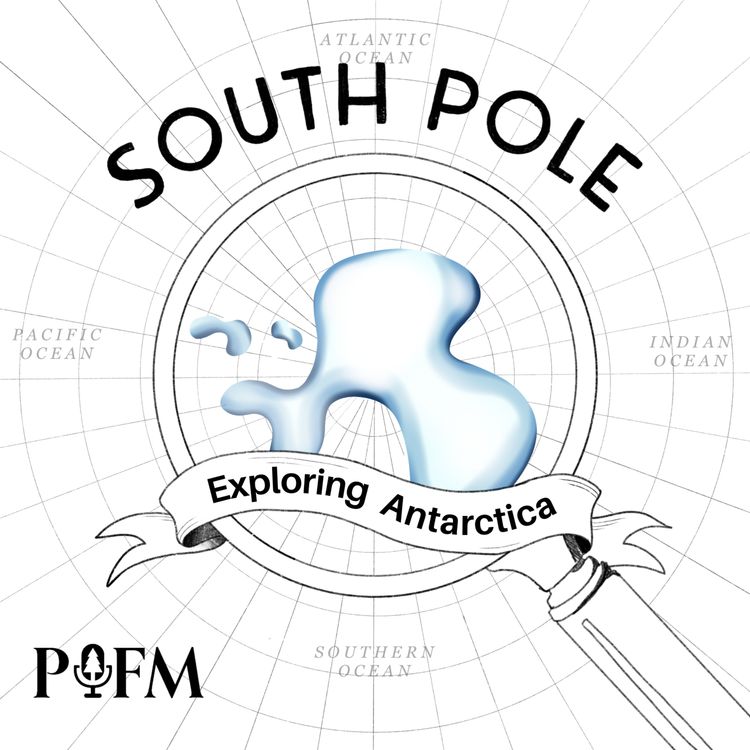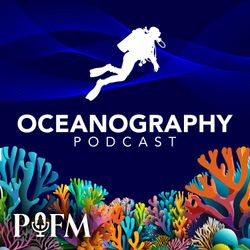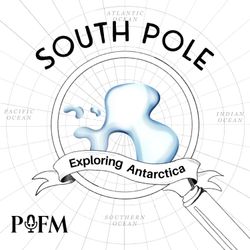Share

South Pole
15. Antarctic Krill: where science, governance, and industry meet with Dr. Javier Arata
In this episode of South Pole, host Clark Marchese interviews Dr. Javier Arata, a marine biologist specializing in fisheries management in Antarctica. They delve into the sustainable harvesting of Antarctic krill, a crucial species supporting ecosystems for penguins, seals, and whales. Dr. Arata shares his experiences as a scientific observer, his work with CCAMLR, and his role in promoting responsible practices through the Association for Responsible Krill Harvesting Companies. They discuss the impacts of climate change, the importance of monitoring krill populations, and innovative conservation strategies, highlighting the critical role of krill in Antarctica’s food web. Tune in to understand how science, policy, and industry come together to protect this essential marine resource.
Episode Guest: Dr. Javier Arata
Find more on Dr. Arata here.
Find Dr. Arata’s publications here.
More on the Association of Responsible Krill harvesting companies (ARK) here
Episode Transcript and more information on the Pine Forest Media Website
Follow Pine Forest Media on Instagram @pineforestmedia
Hosted, produced, written, and edited by Clark Marchese
Cover art and PFM logo by Laurel Wong.
Theme music by Nela Ruiz
More episodes
View all episodes

NEW Science Pod: Oceanography (Trailer)
02:25|Pine Forest Media is proud to present Oceanography, a new podcast hosted by South Pole creator Clark Marchese. This weekly series explores the science and global cooperation needed to protect our oceans.With guests ranging from marine biologists and oceanographers to UN policymakers and community organizers, the show connects science with society—diving into topics like whale communication, bioluminescent species, deep-sea ecosystems, and the future of conservation policy.Oceanography isn’t just about marine life—it’s about the role oceans play in global climate, biodiversity, and justice.The first season includes interviews with the Deputy Global Coordinator at UNESCO and the Tribal Liaison for the Marine Protected Area Collaborative Network.🎧 Listen to the trailer now and follow Oceanography wherever you get your podcasts. First episode drops July 29.Subscribe on Spotify Subscribe on Apple PodcastsOr stream wherever you stream best! 📌 South Pole Season 3 arrives this fall. 🌐 Learn more: pineforestpods.com
10. 20. Putting Antarctic Women on the Map with Carol Devine
33:21||Season 2, Ep. 10In this season finale, South Pole delves into Carol Devine's impactful projects that connect environmental stewardship with Antarctic history. Carol shares her experiences leading the Antarctic Cleanup Project, where volunteers removed waste left in polar regions, modeling environmental accountability. We also explore her Mapping Antarctic Women project, which celebrates female contributions to Antarctic exploration by identifying place names across the continent named in their honor. Through Carol’s stories, listeners gain insight into the intertwined history of human impact and environmental preservation in Antarctica.Episode Guest: Carol DevineLearn more about Carol Devine hereFollow Carol Devine on InstagramFollow Carol Devine on XFind The Antarctic Book of Cooking and Cleaning on Good Reads and Harper CollinsRead about the Mapping Antarctic Women project here Find the Map of Antarctic Women hereEpisode Transcript and more information on the Pine Forest Media WebsiteFollow Pine Forest Media on Instagram @pineforestmediaHosted, produced, written, and edited by Clark Marchese Cover art and PFM logo by Laurel Wong. Theme music by Nela Ruizhf8G6WG2xCPX0XYyU5e0
9. 19. Cold Dirt, Permafrost, and the Greening of Antarctica with Dr. Joe Levy
37:20||Season 2, Ep. 9Explore the secrets locked in Antarctica’s permafrost as we dive into soil formation, ecosystem changes, and climate impacts in the world’s coldest desert. Guest Dr. Joe Levy, a geomorphologist and planetary scientist, shares insights from years of fieldwork in Antarctica’s dry valleys and how studying “cold dirt” offers clues about Earth’s past and Mars’ potential. Discover how warming temperatures and permafrost thaw could transform this frozen landscape into a carbon sink—or trigger unforeseen consequences. Join us as we learn about ancient soils, microbial mats, and the surprising parallels between Antarctica and Mars in this fascinating episode of South Pole.Episode Guest: Dr. Joe LevyLearn more about Dr. Levy hereBrowse Dr. Levy’s publications hereFollow Dr. Levy on XLearn more about the Cold Dirt Lab hereEpisode Transcript and more information on the Pine Forest Media WebsiteFollow Pine Forest Media on Instagram @pineforestmediaHosted, produced, written, and edited by Clark Marchese Cover art and PFM logo by Laurel Wong. Theme music by Nela Ruiz
8. 18. Antarctic Musicology and the Not So Silent Continent with Dr. Carolyn Philpott
38:02||Season 2, Ep. 8Dive into the fascinating world of Antarctic musicology in this episode of *South Pole*. Explore how music, soundscapes, and even silence shape our understanding of the icy continent. Dr. Carolyn Philpott, a senior lecturer and researcher, shares her journey into the interdisciplinary study of music, place, and environment. Discover the sounds of Antarctica—from cracking icebergs to the lively cacophony of penguin colonies—and learn how composers capture the essence of this remote landscape. Whether you’re a music lover or an Antarctica enthusiast, this episode highlights how sound and art foster deeper connections with the natural world. Grab your headphones for an immersive auditory adventure into the heart of the silent continent.Episode Guest: Dr. Carolyn PhilpottLearn more about Dr. Philpott hereBrowse Dr. Philpott’s Publications hereConnect with Dr. Philpott on LinkedInListen to Vaughn Williams’ Scott of the Antarctic on YoutubeListen to Penguin Ballet by Nigel Westlake on Spotify Listen to Seals (Underwater) by Douglass Quinn on YouTubeListen to Antarctic Sound Recordings by Phillip Samartzis on YouTubeIceberg Crash by Almaz KhakimovEpisode Transcript and more information on the Pine Forest Media WebsiteFollow Pine Forest Media on Instagram @pineforestmediaHosted, produced, written, and edited by Clark Marchese Cover art and PFM logo by Laurel Wong. Theme music by Nela Ruiz
7. 17. What if Antarctica had legal personhood? with Cormac Cullinan
35:05||Season 2, Ep. 7This episode explores an ambitious initiative to grant Antarctica legal rights as a distinct entity within international law. A representative from Antarctic Rights discusses how the movement aims to secure a unique legal status for Antarctica, allowing it to be represented in global policy spaces. Topics include the philosophical framework of Earth jurisprudence, the shortcomings of the current Antarctic Treaty, and how a rights-based approach could reshape global environmental law. This conversation also dives into proposed protections and explores the challenges of determining what’s truly in Antarctica’s best interest.Episode Guest: Cormac CullinanLearn more about Cormac Cullinan hereLearn more about Antarctic Rights hereGet involved with Antarctic Rights hereLearn more about Wild Law hereEpisode Transcript and more information on the Pine Forest Media WebsiteFollow Pine Forest Media on Instagram @pineforestmediaHosted, produced, written, and edited by Clark Marchese Cover art and PFM logo by Laurel Wong. Theme music by Nela Ruiz
6. 16. Ice Cores and Paleoclimatology with Dr. Tas van Ommen
44:55||Season 2, Ep. 6In this episode of South Pole, host Clark Marchese dives into the science of paleoclimatology and the fascinating world of ice cores with Dr. Tas van Ommen, an Antarctic climate scientist from the University of Tasmania. Ice cores, described as time capsules, contain some of the oldest Earth system records, revealing invaluable data about past climate conditions, atmospheric composition, and even ancient air trapped within tiny bubbles. Together, Clark and Dr. van Ommen explore how ice cores can help us understand natural climate cycles, inform climate models, and shape current environmental policies, such as drought management in Australia. This episode sheds light on how Antarctic research contributes to our understanding of climate change and highlights the urgency of climate action.Episode Guest: Dr. Tas van OmmenFind more on Dr. van Ommen here.Follow Dr. van Ommen on XFind Dr. van Ommen’s publications here. Episode Transcript and more information on the Pine Forest Media WebsiteFollow Pine Forest Media on Instagram @pineforestmediaHosted, produced, written, and edited by Clark Marchese Cover art and PFM logo by Laurel Wong. Theme music by Nela Ruiz
4. 14. Biodiversity, Food Webs, and Climate Resilience in Antarctica with Dr. Jose Xavier
42:35||Season 2, Ep. 4In this episode, we sink our teeth into the Antarctic food web with marine ecologist Dr. Jose Xavier. Dr. Xavier, an expert in predator-prey interactions in the Southern Ocean, shares his insights on the complex relationships between species like penguins, squid, and krill. The conversation explores how biodiversity supports ecosystem resilience and how climate change threatens these delicate food webs. Dr. Xavier also discusses his research on squid beaks, the impact of climate change on top predators, and how marine protected areas can help safeguard the region. Tune in for a fascinating look at the Antarctic ecosystem, how it's changing, and what can be done to protect it.Episode Guest: Dr. Jose XavierFind more on Dr. Xavier here.Read Dr. Xavier’s Blog here. Episode Transcript and more information on the Pine Forest Media WebsiteFollow Pine Forest Media on Instagram @pineforestmediaHosted, produced, written, and edited by Clark Marchese Cover art and PFM logo by Laurel Wong. Theme music by Nela Ruiz
3. 13. Exploring Antarctica's Wildlife from Space with Dr. Michelle LaRue
26:00||Season 2, Ep. 3In this episode of South Pole, we explore the use of satellite imagery to track Weddell seals and Emperor penguins in Antarctica. Dr. Michelle LaRue, a leading researcher in the field, explains how high-resolution imagery from space provides crucial insights into these marine predators' populations, habitats, and behaviors. We dive into the challenges of studying wildlife remotely, the surprises in population estimates, and the innovative Satellites Over Seals (SOS) project. Tune in to discover how this technology is shaping our understanding of Antarctic ecosystems and its potential for future research and conservation efforts.Episode Guest: Dr. Michelle LaRueFind more on Dr. LaRue at the University of Canterbury Visit Dr. LaRue’s websiteFind Dr. LaRue’s children’s book, Emperor Penguin (Young Zoologist)Episode Transcript and more information on the Pine Forest Media WebsiteFollow Pine Forest Media on Instagram @pineforestmediaHosted, produced, written, and edited by Clark Marchese Cover art and PFM logo by Laurel Wong. Theme music by Nela Ruiz